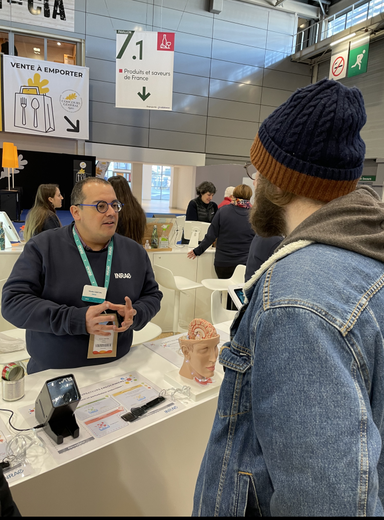Raise citizens’ awareness of the challenges of endocrine disruptors and the best practices to adopt. These are the objectives of Toulouse Métropole, which is organizing three workshops on the subject. The Toulouse researcher Nicolas Cabaton who officiates at INRAE will bring his knowledge on June 1st.
Could you explain what an endocrine disruptor is?
Quite simply, these are chemicals that will disrupt our endocrine system: the system that governs the hormones that regulate the functioning of our body.
Where do we find it?
We find it everywhere: in our food, our drinking water, the air we breathe. It doesn’t kill us in a very short time, like snake venom, but low dose exposures throughout our lives will have an impact. It also depends on the place of life and the eating habits of each person.

Nicolas Cabaton is a toxicology researcher at the Toxalim laboratory.
Which are the most dangerous?
There is no real hierarchy in the dangerousness. The problem comes rather from the regularity of the exposure. The disruptors to which we are particularly exposed are plastics: we eat a lot of them through our diet. Some pesticides are also endocrine disruptors. They have useful effects in agriculture but excessive use is not necessarily recommended.
What are their effects?
Some bind directly to hormone receptors, playing the role of an impostor in a way. They induce hormone-like responses. They result in cancers or modulations of energy metabolism.
Can we get rid of it?
In the case of bisphenol A or other molecules, the body will try to get rid of them as quickly as possible. The substance will be taken over by different enzymes which will transform the initial compound into other substances which can be easily eliminated in an aqueous liquid such as urine. Unfortunately, a perverse system causes the organism to create species that are much more dangerous than the starting molecule.
What advice would you give to readers?
The first advice I would give concerns our consumption habits: limit the consumption of over-packaged products. This can have an impact on industrial production. We are not going to ban everything, it would be ridiculous and we would see other diseases appear. Are we ready to completely do without plastic? He still does a lot of service. What is needed is to stop over-consuming, generating excessive waste that we find in the environment and in our food.
Is bulk a good idea?
If it’s done well yes, but some people use unsuitable, unwashed containers, even garbage bags! We must inform the consumer to put him back in the center and make him actor of his consumption. This is the meaning of the June 1st workshop in which I will participate. We realize that many people do not know about endocrine disruptors.
Legislation on these substances still needs to evolve…
It is certain but all that takes time: it has to go up in the authorities, the ministries. I sincerely believe that we should not expect everything from the public authorities. We must be the driving force behind the changes we want to see.
Workshops to inform citizens
In June, consultation workshops will be organized by Toulouse Métropole and CPIE Terres Toulousaines, an association for environmental education and sustainable development, established in Toulouse since 2001.
Objectives: to draw up proposals for action to inform citizens about endocrine disruptors. With project manager Valentin Labelle, Nicolas Cabaton will lead the workshop on June 1 “in order to feed the group’s reflection on the issues and messages to be transmitted”. The second workshop will take place on June 15. Participants will discuss existing information tools. Finally, on June 22, a proposal for information actions will be drafted. The results of the reflection of the 15 participating citizens will be revealed this fall.

